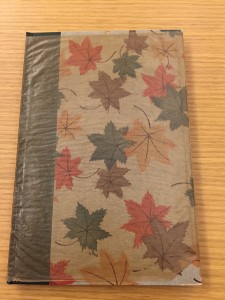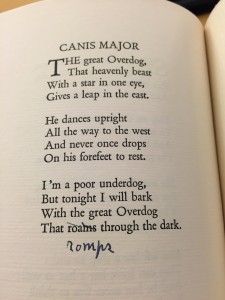[Posted by Aidan Willner for ENG 812 Modern Poetry, Professor Rosen]
 Robert Frost published his sixth collection of poetry titled West-Running Brook in 1928 with the Henry Holt publishing company. The limited special edition featured woodcuts by his friend J.J. Lankes. I was lucky enough to find the 172nd copy of this limited edition at the Watkinson Library here at Trinity College. The book contains all forty two poems that would be found in the first edition separated only by four beautiful woodcut prints. While West-Running Brook did not receive one of Frost’s unfathomable four pulitzer prizes it was a noticeable continuation of prolific career. The front cover is the only other noticeable difference between the special edition and the first edition with an artful spread of falling leaves and tissue paper cover underneath the dust jacket. I thought this jacket was iconic Frost due to the humble presentation. There were no fancy gold letters or intricate designs, just a simple yet appealing arrangement of colorful leaves. This image fits Frost as he wished to present himself as a simple nature poet to the general public.
Robert Frost published his sixth collection of poetry titled West-Running Brook in 1928 with the Henry Holt publishing company. The limited special edition featured woodcuts by his friend J.J. Lankes. I was lucky enough to find the 172nd copy of this limited edition at the Watkinson Library here at Trinity College. The book contains all forty two poems that would be found in the first edition separated only by four beautiful woodcut prints. While West-Running Brook did not receive one of Frost’s unfathomable four pulitzer prizes it was a noticeable continuation of prolific career. The front cover is the only other noticeable difference between the special edition and the first edition with an artful spread of falling leaves and tissue paper cover underneath the dust jacket. I thought this jacket was iconic Frost due to the humble presentation. There were no fancy gold letters or intricate designs, just a simple yet appealing arrangement of colorful leaves. This image fits Frost as he wished to present himself as a simple nature poet to the general public.

 The first edition and special edition were both signed by Frost, but the special edition that I found in the Watkinson has an additional personal touch on the front page. Frost wrote out his poem Canis Major in full with one change from the printed version. The only change comes at the end and shifts the word roams to romps and is made out to Harry Bacon Collamore. Little evidence remains proving the friendship between H. Bacon Collamore and Robert Frost but this subtle clue provides a fair amount of insight. Collamore was a major donor to Trinity College and The Watkinson and it is significant that Frost signed his note to Harry Bacon Collamore instead of abbreviating. This could be proof that the two were on a friendly first name basis with each other.
The first edition and special edition were both signed by Frost, but the special edition that I found in the Watkinson has an additional personal touch on the front page. Frost wrote out his poem Canis Major in full with one change from the printed version. The only change comes at the end and shifts the word roams to romps and is made out to Harry Bacon Collamore. Little evidence remains proving the friendship between H. Bacon Collamore and Robert Frost but this subtle clue provides a fair amount of insight. Collamore was a major donor to Trinity College and The Watkinson and it is significant that Frost signed his note to Harry Bacon Collamore instead of abbreviating. This could be proof that the two were on a friendly first name basis with each other.
The other interesting thing about the personal note is the edit Frost made to his own poem. The edition is in great condition and not a mark has been placed upon the text save for Frost’s opening note and a single penned change on the text of Canis Major. After Frost had written his note to Collamore he went in and made the same change of roams to romps on the text itself. This change would later be made to all subsequent versions and is thought to represent the one flaw that Frost and his editors missed before the original version of West-Running Brook printed.
 Another interesting addition to West-Running Brook is the Athenian Owl Drachma on the title page. The Owl represents the ancient greek symbol for wisdom as well as perspicacity and erudition. It is unlikely that Frost chose this mark for his title page. Henry Holt may have consulted Frost before including the symbol but it would have been his decision to make. The symbol was appropriated during the turn of the 20th century in the west as a symbol of knowledge and eduction. It became widespread and this is likely what led Holt to include it. The image itself is of a Greek drachma coin and has since been used on the back side of the euro in Greece.
Another interesting addition to West-Running Brook is the Athenian Owl Drachma on the title page. The Owl represents the ancient greek symbol for wisdom as well as perspicacity and erudition. It is unlikely that Frost chose this mark for his title page. Henry Holt may have consulted Frost before including the symbol but it would have been his decision to make. The symbol was appropriated during the turn of the 20th century in the west as a symbol of knowledge and eduction. It became widespread and this is likely what led Holt to include it. The image itself is of a Greek drachma coin and has since been used on the back side of the euro in Greece.

